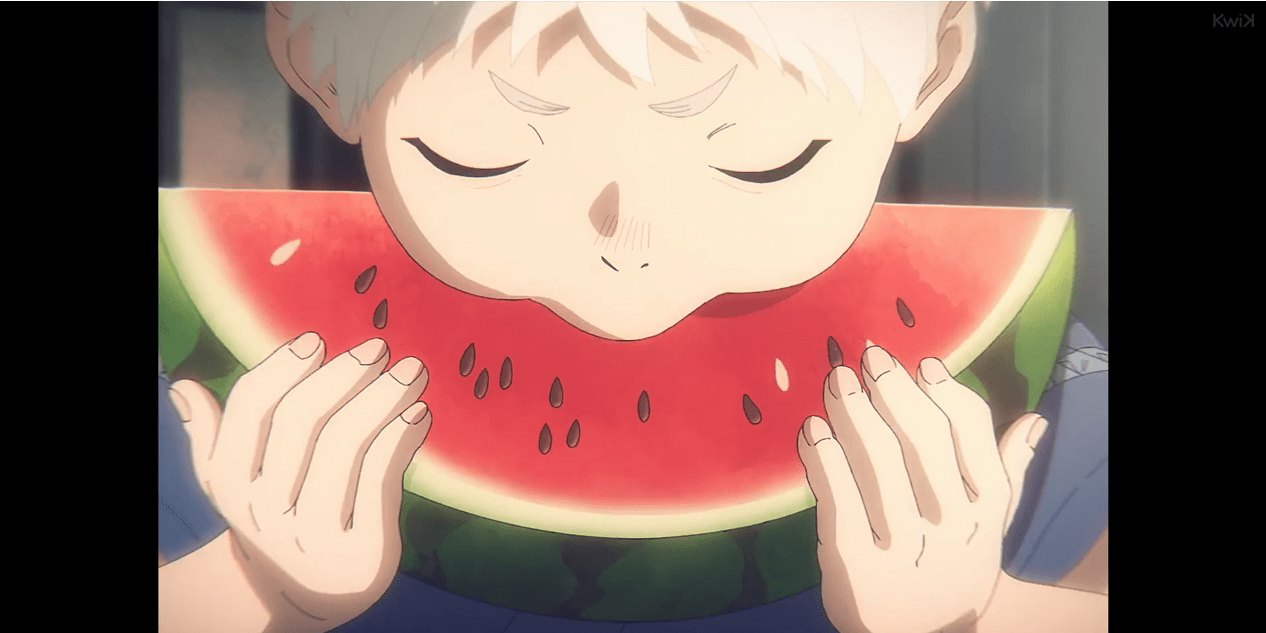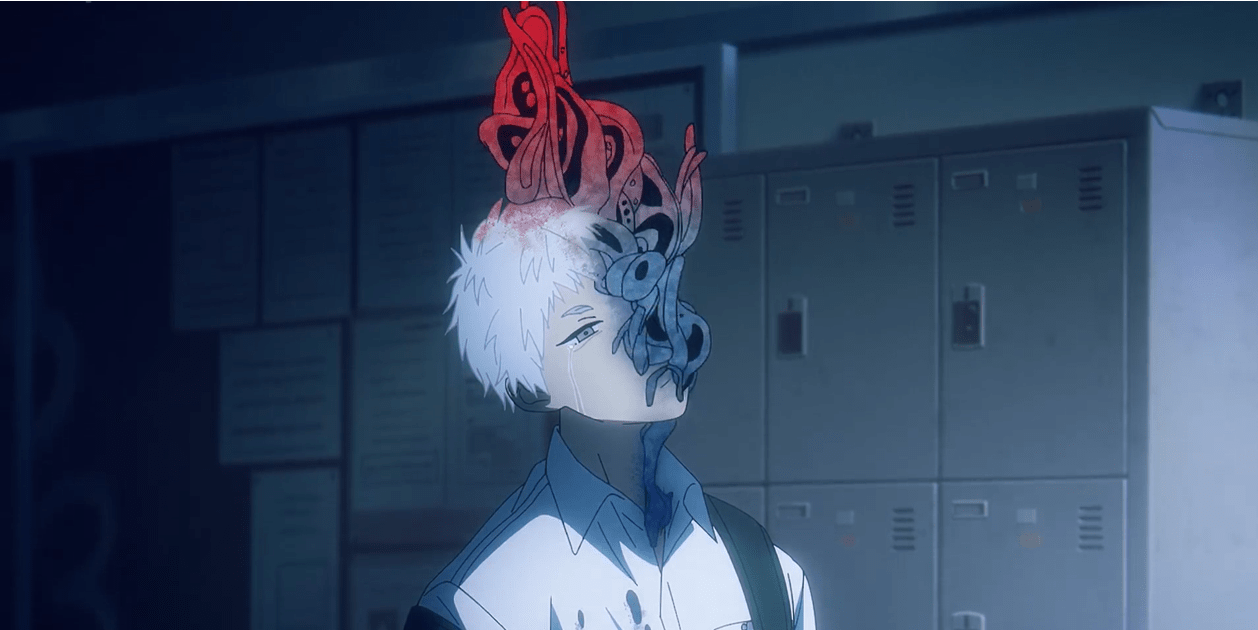In Episode 3 of Netflix’s ‘The Summer Hikaru Died,’ Yoshiki finds more answers regarding the mystery of his childhood friend being replaced by a mysterious entity. The duo forms a bond of its own, but it is not without its unique set of problems. The protagonist struggles to balance his memories of the past with his expectations of the present, and soon this results in chaos. In the previous episode, Yoshiki met Rie Kurebayashi, a mystic who warns him that prolonging his stay with his friend will result in the two merging. This fear is substantiated by Hikaru’s display of strength, as he easily consumes a spirit that tries to latch onto his friend. With the recent string of paranormal events that have plagued the town, Hikaru’s true aim becomes the primary subject of the narrative. SPOILERS AHEAD.
A Fond Childhood Memory Turns Into a Haunting Reminder
The episode begins with a flashback to Yoshiki and Hikaru’s childhood, when, during summer breaks, the two would gather at the latter’s house. Yoshiki gobbles up a watermelon in a cartoonish fashion before noticing that he just swallowed a seed. He recalls that one of his father’s friends supposedly made the same mistake before turning into a watermelon and dying. Hearing this, the protagonist begins to cry, pointing out that he ate a seed as well. Their childish fears are then dispelled by Hikaru’s father, who appears to be a blue-collar worker. At present, Yoshiki continues the annual trend and brings a watermelon to share with Hikaru at his residence. The latter mimics his past quirks perfectly and chomps down the watermelon, leaving the protagonist with mixed feelings.

As Hikaru continues to tread old steps, Yoshiki gets overwhelmed with memories and struggles to maintain his facade of normalcy. His friend observes this and thanks him for spending time together. Following this, he promptly falls asleep, leaving Yoshiki to dig further into his past. His mind hovers over Hikaru’s father, who died under similar circumstances to his son: climbing up the forbidden mountain. Upon noticing a series of photographs from his friend’s childhood, the protagonist recalls how they were the only two kids of their age at that point, which naturally led to them becoming close. However, Yoshiki’s anguish soon takes over again, and he is forced to confront the fact that the person captured in those photos is dead. Unable to bear it anymore, he pukes.
Yoshiki’s Meeting With Rie Sheds More Light on the Truth
Following his nervous breakdown, Yoshiki sits in the room, hesitating to text Rie Kurebayashi, but ultimately chooses to give in. Right after, he is summoned by Hikaru’s mother, and leaves his phone, which then buzzes with Rie’s reply, asking him if he’s ready. It is Hikaru who ends up seeing the message, which leads him to wonder who this person in his friend’s life is. The scene then changes to Yoshiki meeting Rie, with the two deciding to have a meal at a restaurant called American Diner. Having potentially found an ally at last, the protagonist pours his heart out, telling her everything he’s been through so far. In return, Rie compassionately asks him to stop punishing and burdening himself, and instead see things in a different light.

In the same breath, Rie also says that both of them need to face the truth that their loved ones are gone, a statement that stands out to Yoshiki due to her self-inclusion. Rie quickly turns to the next subject, thinking to herself that Yoshiki and Hikaru merging means that their bond is stronger than usual, likely even romantic. She then begins explaining to him how Yoshiki is connected to all the strange occurrences that have been taking place in and around the village of late, something he has had first-hand experience with. She continues, describing the evil she felt from the mountain as a mass straight from hell. Since its disappearance from that location, she has been feeling that presence all over the village. She speculates that the mountain might have been acting as a container, and now the malevolent spirit has been unleashed.

Rie expresses her desire to run away from the place, just like her son has, but is held back by her mother-in-law and daughter being there. Here, we finally learn of her tragic past; one day, her husband returned home in an altered state, and ended up giving her son a wound that “would never heal.” While we are not told about the details of the incident, it is most likely connected to the negative energy she mentions. She explains that she, too, wishes to cling to her past, but ultimately understands that she must not. However, things are not so easy for Yoshiki, who feels hopeless at the mere thought of letting go of Hikaru. The scene’s grim tone is contrasted by the exuberant food dish the duo has ordered, but the protagonist seemingly feels no hunger; his mind has already wandered over to more pressing concerns.
Yoshiki Snaps at Last
Back in the classroom, Yoshiki begins to connect the dots, and he realizes that Hikaru is not just powerful, but a dangerous entity that is capable of killing him at any moment. In light of this, he stands as the most likely culprit behind Ms. Matsuura’s murder, alongside all the recent frays in Kubitachi village. Slowly, fear and frustration begin to pile up inside the protagonist, which come to a head when Hikaru eventually finds him. The latter’s attempts to brighten the mood seem to go to waste, and soon things take an aggressive turn. Yoshiki shoves his friend’s hands away, no longer capable of trusting him. Hikaru grows anxious and starts enquiring about his friend’s mystery visits to a stranger, who in turn claims that he doesn’t owe him any explanations.

Hikaru bemoans that Yoshiki used to share everything with him, at which point, the latter drops a bombshell: he does not think of Hikaru as his old friend. This seems to hurt Hikaru at his core, and he begins to slip in and out of his human form. He forcefully grabs Yoshiki’s hand and asks if he is not good enough for the protagonist. The entity seems to break down completely, with its twisted form slowly seeping into the entire classroom. The protagonist does not relent either, and pours out the truth, while the person in front of him is a complete replica of his dead friend, he cannot be called or treated as the same. Hearing this, Hikaru finally stops resisting the idea and agrees, but he adds that he needs his friend in his life. In the middle of his breakdown, he cries out that Yoshiki is his first, but is unable to finish the sentence.
Hikaru’s True Form Comes Out in an Outburst of Feelings
Hikaru realizes that he can no longer tell his past emotions apart from his present, and he begins to spiral out of control. He reiterates his pure love for Yoshiki but, at the same time, imagines a version of his friend, who is cold and distanced, and who labels him an impostor. This seems to be Hikaru’s snapping point, as he then unleashes his true form, a kaleidoscopic swirl that takes over the entire classroom and envelopes Yoshiki as a whole. With Hikaru lying on top, the swirl then begins to gush into the protagonist, choking him at first, but later being described as a good sensation. At this point, he begins to see flashes of a person, one who looks like Hikaru, carrying what appears to be a severed head. Before he can process these visions, Hikaru snaps out of it and immediately frees Yoshiki.

Yoshiki wakes up choking and finds his friend in tears, expressing how he cannot do this to him of all people. Seemingly at his wits’ end, Hikaru apologizes and begs the protagonist not to hate him, before abruptly leaving. Alone at last, Yoshiki lies down and tries to piece together the events before ultimately realizing the flaw in his approach. Given their mutual acceptance that he is different from Yoshiki, for him to use his deceased friend as a checkpoint is unfair to the new Hikaru. This idea is strengthened the following day, when the latter misses school, and all his friends pool around Yoshiki asking him to make amends. They bring up the idea that Hikaru’s attachment to the protagonist is akin to a child and their mother, following which the latter has an epiphany.
Yoshiki and Hikaru Have a New Start
Yoshiki rushes his way to Hikaru’s home, understanding the true nature of their dynamic at last. He finds his friend covered in a blanket, still visibly affected by the events of the last day. The protagonist comes closer and states that he is no longer mad. However, Hikaru doesn’t seem convinced and points out how the incident must have permanently altered Yoshiki’s impression of him. He then breaks down into tears once again, begging not to be hated, as he thinks of Yoshiki as his sole anchor in the world. The protagonist himself begins to feel a change inside, and despite acknowledging the risk, chooses to come closer to Hikaru either way, both physically and emotionally. Holding the latter’s cheek, likening him to a lonely little child.

Hikaru appears to be surprised at hearing the word lonely, not knowing that it is the term used to refer to his present condition. This further strengthens Yoshiki’s understanding of him, as he now thinks of Hikaru as a child-like entity with pure intentions but enormous power. As such, the protagonist’s goal changes from moulding his friend a certain way, or pretending that things haven’t changed, to instead teaching him how to live life. While the episode ends on an optimistic note, its final sequence shows a scenery of decay: Sunflowers, which represent Yoshiki’s bond with the original Hikaru. While they definitely are closer than before, the looming threat of the latter’s powers still persists, as symbolized by the scar on the protagonist’s hand, which appears to be unnaturally potent in of itself.
Read More: The Summer Hikaru Died Episode 2 Recap: Suspicion


